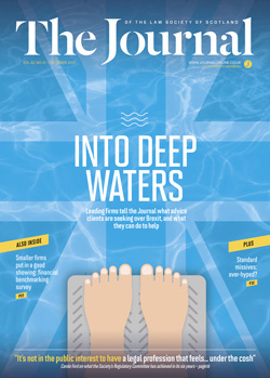President's column
As you read this, I’ll be away at the International Bar Association annual conference in Sydney. This is a great opportunity to promote the Scottish legal profession to overseas colleagues and to come home knowledgeable about initiatives others are working on.
On home soil, we’ve just had our annual conference on the “greater good” theme. What a great day that was with a wide range of speakers, and fringe sessions for the first time. Thanks again to all our sponsors and speakers who gave their time, expertise and money. There were so many good things that it was difficult to know which to go to. As President, I had the luxury of dipping in and out. The finale was our past President and budding chat show host Austin Lafferty talking to Olympic gold medallist Dame Katherine Grainger. Her off-the-cuff ending, “You lawyers deserve a gold medal every day for what you do,” was a great way to send us home happy!
Moving from gold medals to gold discs, Abba famously sang: “Money, money, money, must be funny”. Money is of course vital to running a successful business, and our financial benchmarking survey (see www.lawscot.org.uk), in association with Clydesdale Bank, looked at the financial health of 100 law firms.
Those of a certain vintage will recall that originally this “cost of time” survey was used to set the cost of the unit of time. It was based on a theoretical number of chargeable hours (1,000) and what was considered a reasonable rate of income (originally I believe linked to a civil service grade). Setting a standard level of fees was eventually deemed anti-competitive and we stopped recommending a rate. Fees then generally increased. Until recently, though, it was possible to work out what that unit charge needed to be; that was used to try to influence prescribed recovery rates in civil litigation. Such a rate would have been around £150 per hour.
Breaking down the results
Our new, improved survey focuses on all parts of the business, not just the cost of time. But what do the results tell us? Interestingly, some smaller firms appear to be doing well, while some larger firms appear unable to take full advantage of economies of scale. For the first time, the results also look at firms’ expenditure – see p 22 for more on that – as well as partner earnings and rates charged.
The option that most firms selected for hourly civil court fee rates was £150 to £200. Yet as litigators know, recoverable expenses are below that rate, and many firms in my experience charge well over £200 for private court work (criminal or civil).
I well remember a respected Glasgow lawyer telling me several years ago that anyone charging less than £250 an hour for court work couldn’t make a living! Yet the average hourly fee of the specialist legal aid firms (median values) is £60.02, according to our report into the financial health of legal aid firms published in February. Historically legal aid was up to 90% of the recommended rate. Now it would be nowhere near this. Yet so many members still do legal aid work; I met some of them at our recent legal aid conference.
So what do we “fat cat lawyers” actually earn? The median for every partner in the survey was £69,000, which is in line with the 2014 survey but well below the pre-recession figure. The RBS survey of their clients showed a UK median of £111,000! Comparisons with the dental, medical and other professions indicate that our median figure falls well short. Yes, we all know of lawyers who are doing better, so that means a number are doing far worse.
It’s never really been about the money for me. I love what I do, and I know that’s the case for many solicitors, but that shouldn’t devalue the important work we do on behalf of our clients.
There is so much information in the survey, so look at it yourself and next year, if you work in private practice, please take part so that the figures are even more useful.
To finish with Abba, “I work all night, I work all day, to pay the bills I have to pay”. Hopefully, like me, there’s a bit of satisfaction in there for you.
In this issue
- Form that misses the mark
- The dual role: before and after
- Don't just write – plan
- CMS enforcement: little help when needed?
- Flight or fight
- Reading for pleasure
- Opinion: Campbell Deane
- Book reviews
- Profile
- President's column
- Knowledge base becomes smarter
- People on the move
- Brexit: planning for "What if?"
- Report card
- Greater good and greatest need
- Finances: big not always better
- Doulas: living and dying well in Scotland
- Lobbying: the new regime
- Protect yourselves, Society warns
- Ending short sentences: impact on the courts
- Board policy: do not shake
- Brexit and professional sport
- Rely on HMRC's guidance at your peril
- Standard missives: an unachievable dream?
- Let in-house keep you right
- Accredited specialists: five years can qualify
- What's Daisy done?: Society's new campaign
- Law reform roundup
- Wartime honour
- Paralegal pointers
- Society sets up secure channel
- All fee earners now
- Stand up to your stammer
- The data imperative
- Ask Ash
- In-house: my client, my job?
- Q&A corner
- Giving cheques a new image






